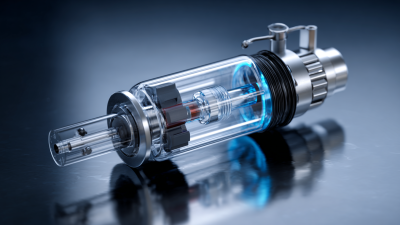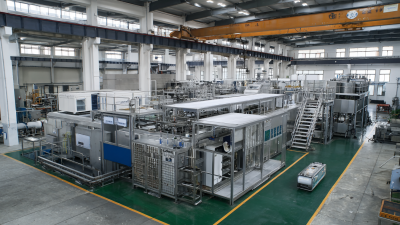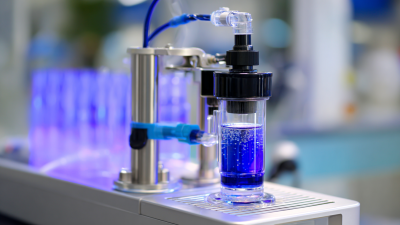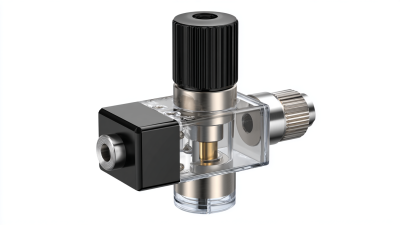In today's competitive landscape, the efficiency and precision of chemical dosing processes play a crucial role in the success of many industries, from water treatment to pharmaceuticals.

Metering dosing pumps have emerged as a key component in achieving these goals, enabling businesses to optimize their operations while ensuring accuracy and reliability. According to a recent market study by Research and Markets, the global metering pumps market is expected to reach $5.2 billion by 2026, reflecting a compound annual growth rate (CAGR) of 6.3% from 2021 to 2026.
This highlights a growing recognition of the importance of metering dosing pumps in enhancing productivity and minimizing waste. In this blog, we will explore five compelling reasons why metering dosing pumps are essential for your business success, focusing on their role in not only improving operational performance but also delivering significant cost savings and compliance with stringent industry regulations.
In today’s competitive landscape, operational efficiency is paramount for business success, and metering dosing pumps play a critical role in this regard. These precision tools are designed to deliver consistent and accurate flow rates, ensuring that processes run smoothly and products meet quality standards. By utilizing metering dosing pumps, businesses can significantly minimize waste, reduce operational costs, and enhance overall productivity.

The growing metering pumps market, projected to reach USD 8.5 billion by 2028, underscores the increasing recognition of these pumps in various industries. Whether in chemical processing, water treatment, or food and beverage production, the adaptation of advanced metering dosing technology can streamline operations. By optimizing chemical dosages and improving the reliability of fluid handling, organizations not only achieve compliance with regulatory standards but also bolster their bottom line. As businesses seek innovative ways to enhance efficiency, metering dosing pumps will undoubtedly be at the forefront of this transformation.
Accurate dosing is critical across various industries, including pharmaceuticals, food and beverage, and chemical manufacturing. According to a report by MarketsandMarkets, the global metering pump market is projected to grow from $5.2 billion in 2020 to $6.7 billion by 2025, reflecting an annual growth rate of 5.2%. This growth underscores the increasing reliance on precision dosing solutions as businesses strive to enhance efficiency and maintain compliance with stringent regulatory standards.
Moreover, a study published by Research and Markets highlights that up to 25% of chemical processing costs can be attributed to inaccuracies in dosing practices. This inefficiency can lead to product wastage, increased operational costs, and potential safety hazards. By utilizing metering dosing pumps, businesses can not only minimize these risks but also improve product consistency and quality. As industries increasingly focus on sustainability and waste reduction, the role of accurate dosing becomes ever more vital, making metering dosing pumps an essential investment for business success.
Metering dosing pumps play a crucial role in enhancing operational efficiency by ensuring precise and accurate chemical dosing. By delivering the exact amount of chemicals needed for various processes, these pumps significantly reduce the likelihood of overuse and waste. This precision not only minimizes costs associated with purchasing excess chemicals but also helps organizations adhere to environmental regulations by minimizing chemical discharge and waste.

Additionally, metering dosing pumps contribute to cost savings through their reliability and automation capabilities. With their ability to consistently deliver precise doses, companies can reduce labor costs associated with manual mixing and monitoring. This automation also leads to less downtime since the pumps can operate continuously and efficiently without requiring constant human oversight.
Ultimately, investing in metering dosing pumps not only streamlines processes but also fosters a more sustainable business model by reducing waste and optimizing resource usage.
Precision dosing plays a pivotal role in ensuring product quality and consistency across various industries, particularly in pharmaceuticals, chemicals, and food production. According to a report by the National Center for Biotechnology Information, approximately 30% of pharmaceutical production defects are attributed to inaccuracies in ingredient dosing. This statistic highlights the critical need for accurate metering dosing pumps that deliver precise amounts of materials, resulting in superior product integrity and reduced waste.
Moreover, the use of metering dosing pumps can significantly enhance operational efficiency. A study by the Food and Drug Administration found that industries utilizing precise dosing mechanisms reported a 25% reduction in production variability. This improvement translates to higher customer satisfaction due to consistent product quality and a marked decrease in rework costs. By investing in metering dosing pumps, businesses not only comply with industry regulations but also gain a competitive edge in delivering reliable products that meet consumer expectations.
| Reason | Description | Impact on Product Quality | Impact on Consistency |
|---|---|---|---|
| 1. Accuracy | Ensures precise measurement of ingredients in formulations. | Improves end product formulation integrity. | Minimizes variations between batches. |
| 2. Efficiency | Reduces waste by delivering the exact amount needed. | Enhances resource utilization, leading to higher quality products. | Consistent use of raw materials boosts uniformity. |
| 3. Flexibility | Allows quick adjustments to formulations as needed. | Facilitates product innovation and improvement. | Promotes uniformity across various product lines. |
| 4. Automation | Integrates with automated systems for seamless operation. | Reduces human error, thus enhancing quality control. | Ensures batch consistency with minimal variations. |
| 5. Compliance | Meets industry standards and regulatory requirements. | Ensures products meet quality certifications. | Maintains product consistency to satisfy regulatory audits. |
Innovations in metering dosing pump technology are reshaping the landscape of various industries, particularly in water treatment and chemical processing. As businesses seek to improve operational efficiency and comply with stringent regulations, advanced dosing pump systems offer precision and reliability. These innovations not only enhance measurement accuracy but also ensure consistent delivery of fluids, which is crucial for maintaining product quality and achieving operational goals.
The metering pumps market is projected to reach USD 8.5 billion by 2028, highlighting the growing recognition of their importance in industrial applications. Recent acquisitions in the sector further fortify product offerings, creating synergies that support infrastructure development, particularly in regions like Africa. Companies are increasingly investing in next-generation metering solutions, such as the latest innovations unveiled at industry conventions, which underscore the commitment to delivering optimum performance while minimizing environmental impact and costs. With such advancements, businesses can expect significant improvements in productivity and compliance, ultimately driving their success in competitive markets.






